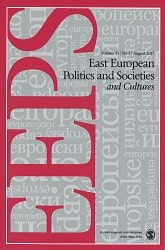Changing Frames of Reconciliation: The Politics of Peace-Building in the Former Yugoslavia
Changing Frames of Reconciliation: The Politics of Peace-Building in the Former Yugoslavia
Author(s): Heleen Touquet, Peter VermeerschSubject(s): International Law, Human Rights and Humanitarian Law, Law and Transitional Justice, Political history, Government/Political systems, Transformation Period (1990 - 2010), EU-Approach / EU-Accession / EU-Development, Sociology of Politics, Politics of History/Memory, Peace and Conflict Studies, Wars in Jugoslavia
Published by: SAGE Publications Ltd
Keywords: Balkans; reconciliation; peace-building; European Union;
Summary/Abstract: In this article, we examine reconciliation as a category of political practice. More particularly, we explore the ways in which the term reconciliation has been employed and invested with meaning in the recent legal, social, and political discussions on transitional justice and EU accession in the former Yugoslavia. Much of the literature on the former Yugoslavia highlights the need for reconciliation and envisages it as the ultimate goal of a process of societal and political transformation. But what does reconciliation mean? Our assertion is that reconciliation is a dynamic term; its meaning varies across discursive fields and according to the implicit assumptions associated with it. This article investigates a number of ways in which the term reconciliation has been given meaning in the former Yugoslavia through an exploratory analysis of three related fields of political discussion: (1) transitional justice, in particular the arena of discursive interaction surrounding the completion of the activities of the ICTY in The Hague; (2) the human rights and enlargement agenda of the EU; and (3) local and regional civil society initiatives, including the RECOM initiative, which calls for the establishment of a mechanism for truth-telling and reconciliation across all the countries of the former Yugoslavia. On the basis of an analysis of public statements by politicians and activists, as well as some interviews with key actors in these three fields, we show that reconciliation is mobilized in varying and often conflicting ways.
Journal: East European Politics and Societies
- Issue Year: 30/2016
- Issue No: 01
- Page Range: 55-73
- Page Count: 19
- Language: English
- Content File-PDF

